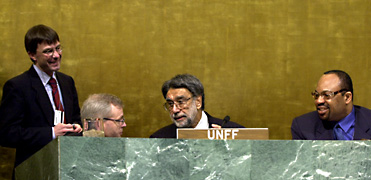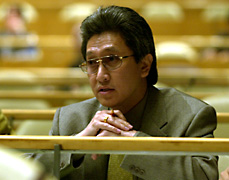 |
UNFF-2:
Second
Session of the United Nations Forum on Forests
UN Headquarters || 4-15 March 2002 |
|
 |
Day 2: Tuesday, 5 March On the second day of UNFF-2, delegates spent the morning discussing possible elements for a ministerial message from UNFF-2 to WSSD. In the afternoon, participants resumed the debate on the draft terms of reference of the ad hoc working groups. Left: Jag Maini, Head of the UNFF Secretariat; Patricia Chaves (Costa Rica), Chair of the discussions on the draft terms of reference of the ad hoc working groups; and Mia Soderlund, UNFF Secretariat; at the dais of the UN General Assembly Hall during the afternoon session. |
||||||||||||||||||||||||||||||||||||||||||||
|
|








